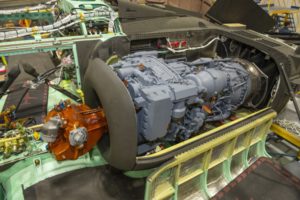NASHVILLE, Tenn. — Senior Army aviation officials confirmed delivery of the service’s new General Electric Aviation [GE]-built helicopter engine is set for this fall, adding they’re “committed” to the system following several delays.
Gen. Rob Barrie, the Army’s program executive officer for aviation, told reporters last Thursday the service will look to get the GE T901 engine, developed under Improved Turbine Engine Program (ITEP), onto Black Hawks and then Apaches within the next few years after the initial effort to integrate it on the Future Attack Reconnaissance Aircraft (FARA) prototypes.

“The delivery [timeline] that we committed to the Army for the fall of this year for those FARA engines is achievable. If that should not be the case at some point in the future, we will be very transparent,” Barrie said during a media briefing at the Army Aviation Mission Solutions Summit in Nashville.
GE Aviation was awarded a $517 million contract in Feb. 2019 to develop its T901 engine for ITEP, which will eventually power the Army’s AH-64 Apache and UH-60 Black Hawk helicopters as well as the future FARA platform.
The Army has faced several delays in getting the GE ITEP engines to Bell [TXT] and Sikorsky [LMT], the two competitors building FARA prototypes, with Doug Bush, the service’s top acquisition official, citing “manufacturing challenges” with the program.
“If you look at long-term sustainment of the fleet, having three aircraft that have commonality in the engine does big things for us in the sustainment world later on,” Maj. Gen. Michael McCurry, commander of the Army Aviation Center of Excellence, told reporters. “We knew that this was hard work for a developmental program. We’re still committed to doing it. We ran into a couple of things, small things like pandemics and supply chains, and Gen. Barrie and the team have worked through that with our vendor.”
Barrie noted the timeline for ITEP had to factor in the use of new parts being worked with the first time and incorporating advanced manufacturing processes.
“My concern programmatically was [that] in an effort, for all the right reasons, to push the schedule, we did not have any slack in our schedule. And that is no way to manage a developmental program. So the schedule I referred to does have adequate margin,” Barrie said.
Barrie’s confirmation of the delivery goal for this fall follows Sikorsky President Paul Lemmo’s comments to reporters on Tuesday that the company expected to receive the new engine in October which would put its FARA prototype on track for first flight in summer of 2024 (Defense Daily, April 25).
“I wouldn’t want to pin down either of the two competitors on that point [of first flight]. It’ll be up to Bell and Sikorsky on what exactly occurs before they fly,” Barrie said.
After delivery to Bell and Sikorsky this fall, the GE ITEP engines will go through initial flight qualification to begin test activities leading into first FARA flights next year, according to Barrie.
Following the work with FARA, Black Hawk will be the next platform to begin integration with the ITEP engine, with Apache to follow, Barrie noted.
Bush told lawmakers last week the ITEP engine delay has pushed back the FARA schedule by around eight months, with a Milestone B decision now planned for the first quarter of fiscal year 2026 (Defense Daily, April 20).